M.I. Lastman's Blog, page 7
June 19, 2015
Aforementioned: aphorisms and questions for 2015
Can the Earth fill mouths indefinitely? Maybe, but bodies with nothing better to do reap warfare and destruction. 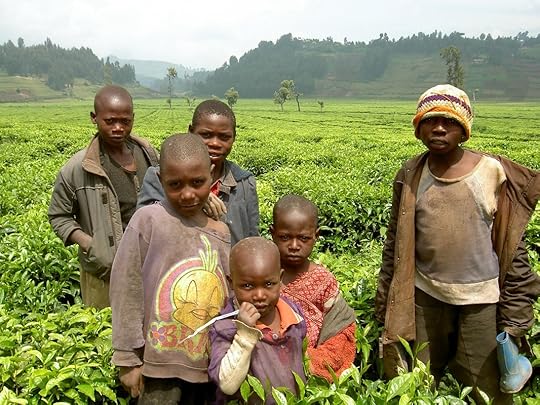
 The first picture was chosen because it expresses a part of the above aphorism. These beautiful boys are standing in a field in Rwanda, one of the most food-fruitful places on earth. It was also the site of a terrible internal genocide. That had nothing to do with the race of these lads; genocide does not select for skin colour. On the other hand, that there were so many people in this small country struggling to share scarce creative space was surely the root cause.
The first picture was chosen because it expresses a part of the above aphorism. These beautiful boys are standing in a field in Rwanda, one of the most food-fruitful places on earth. It was also the site of a terrible internal genocide. That had nothing to do with the race of these lads; genocide does not select for skin colour. On the other hand, that there were so many people in this small country struggling to share scarce creative space was surely the root cause.
The same might be said of the second picture showing Germany boys enjoying an abundant Christmas feast just prior to the Second World War.

 The first picture was chosen because it expresses a part of the above aphorism. These beautiful boys are standing in a field in Rwanda, one of the most food-fruitful places on earth. It was also the site of a terrible internal genocide. That had nothing to do with the race of these lads; genocide does not select for skin colour. On the other hand, that there were so many people in this small country struggling to share scarce creative space was surely the root cause.
The first picture was chosen because it expresses a part of the above aphorism. These beautiful boys are standing in a field in Rwanda, one of the most food-fruitful places on earth. It was also the site of a terrible internal genocide. That had nothing to do with the race of these lads; genocide does not select for skin colour. On the other hand, that there were so many people in this small country struggling to share scarce creative space was surely the root cause.The same might be said of the second picture showing Germany boys enjoying an abundant Christmas feast just prior to the Second World War.
Published on June 19, 2015 07:35
June 18, 2015
Aforementioned: aphorisms and questions for 2015
We have pillaged our natural home for our convenience alone and infected it with a high fever. 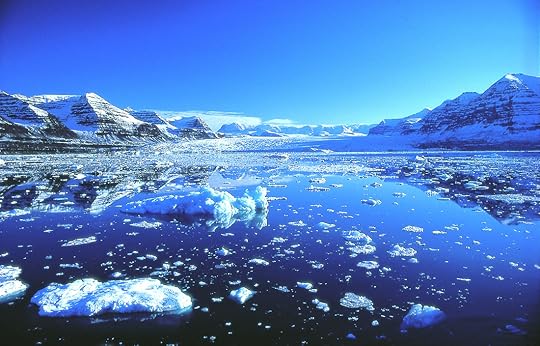
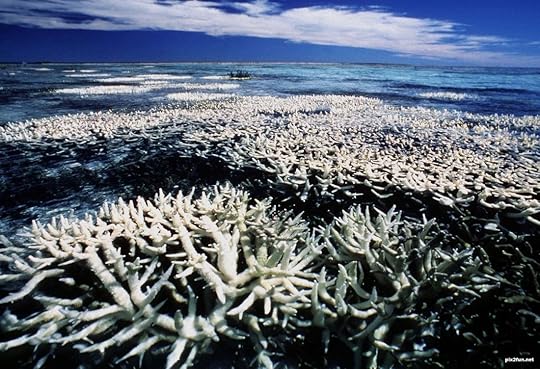
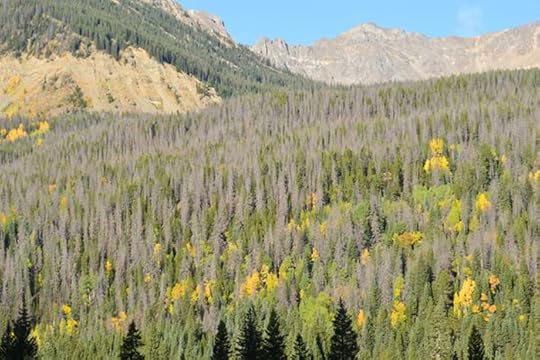
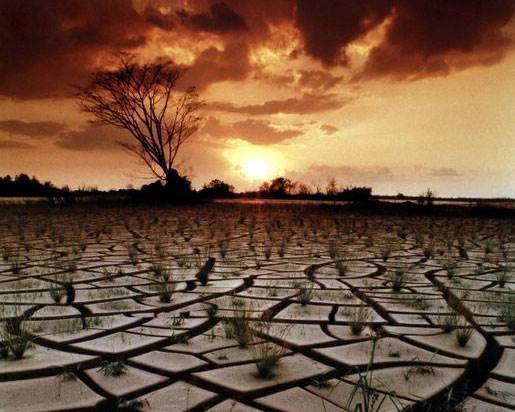 We would like to treat these pictures as deeply troubling, but isolated occurrences. We can't of course; the whole world is on fire with the plague of homo sapiens (PoHS).
We would like to treat these pictures as deeply troubling, but isolated occurrences. We can't of course; the whole world is on fire with the plague of homo sapiens (PoHS).



 We would like to treat these pictures as deeply troubling, but isolated occurrences. We can't of course; the whole world is on fire with the plague of homo sapiens (PoHS).
We would like to treat these pictures as deeply troubling, but isolated occurrences. We can't of course; the whole world is on fire with the plague of homo sapiens (PoHS).
Published on June 18, 2015 06:08
June 17, 2015
Aforementioned: aphorisms and questions for 2015
250 million years ago, Siberian eruptions nearly ended life but heated the heavens much more slowly than now. 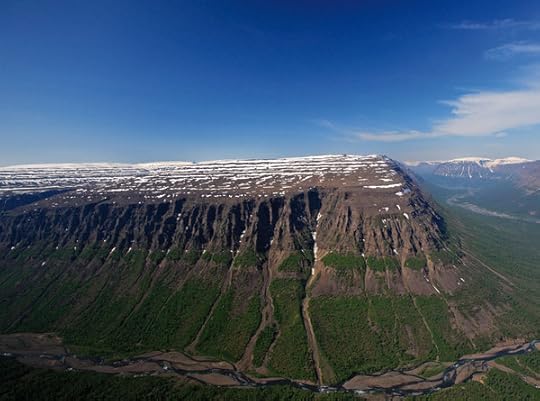
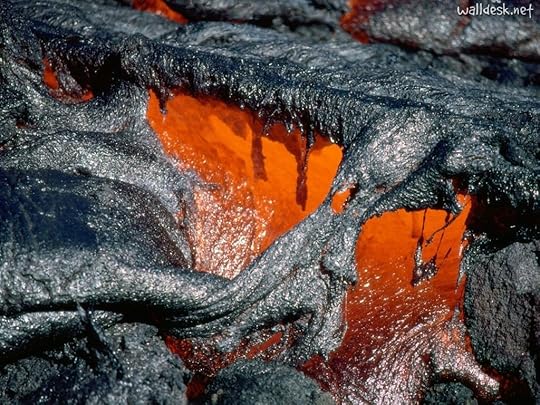
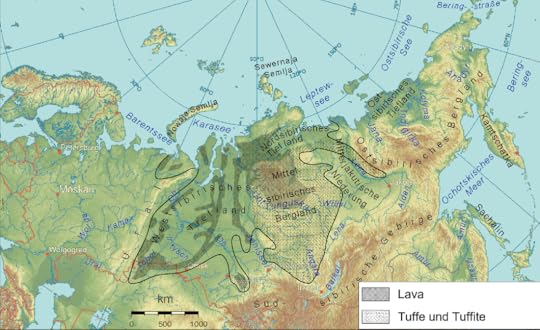
 The blog may be a little difficult to understand. The first and last pictures give some idea of the majesty of some of the features of the Siberian basalt traps. The map shows their extent (about half the area of Canada) and picture two reminds us of the gaseous outflow of a lava flow. The important thing is that all this mighty geophysical activity dramatically increased the temperature of the planet. The average temperature of the surface of the ocean at the equator may have reached 40 degrees celcius. This compares compares
The blog may be a little difficult to understand. The first and last pictures give some idea of the majesty of some of the features of the Siberian basalt traps. The map shows their extent (about half the area of Canada) and picture two reminds us of the gaseous outflow of a lava flow. The important thing is that all this mighty geophysical activity dramatically increased the temperature of the planet. The average temperature of the surface of the ocean at the equator may have reached 40 degrees celcius. This compares compares



 The blog may be a little difficult to understand. The first and last pictures give some idea of the majesty of some of the features of the Siberian basalt traps. The map shows their extent (about half the area of Canada) and picture two reminds us of the gaseous outflow of a lava flow. The important thing is that all this mighty geophysical activity dramatically increased the temperature of the planet. The average temperature of the surface of the ocean at the equator may have reached 40 degrees celcius. This compares compares
The blog may be a little difficult to understand. The first and last pictures give some idea of the majesty of some of the features of the Siberian basalt traps. The map shows their extent (about half the area of Canada) and picture two reminds us of the gaseous outflow of a lava flow. The important thing is that all this mighty geophysical activity dramatically increased the temperature of the planet. The average temperature of the surface of the ocean at the equator may have reached 40 degrees celcius. This compares compares
Published on June 17, 2015 14:19
June 16, 2015
Aforementioned: aphorisms and questions for 2015
During WWII, no one debated the cost of beating fascism. Today we must cure the crisis of the biosphere at all costs. 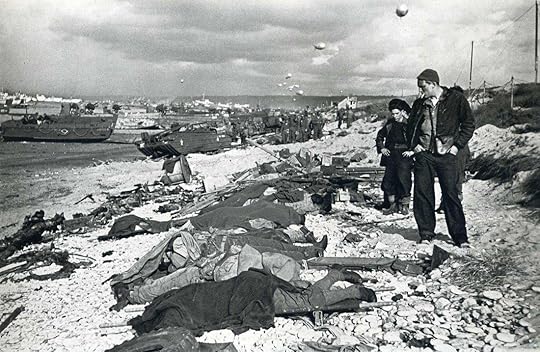
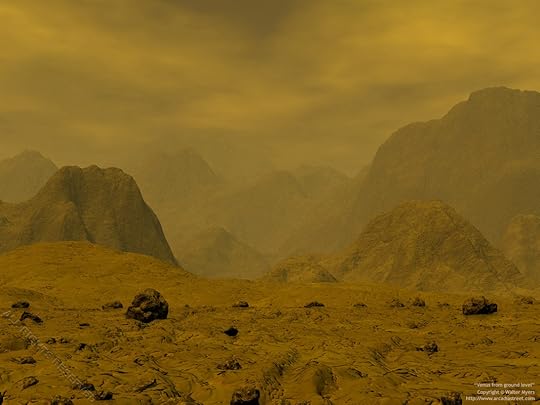 These two pictures are not strictly analagous. The first shows bodies on the beaches of Normandy as a memorial of the cost of winning the Second World War. The second picture shows the cost of not winning the struggle to cure the crisis of the biosphere. If we do not act immediately to reverse the global heat spike, a fate something like the surface of Venus awaits the surface of the Earth, maybe within as short a time as a relatively few human generations.
These two pictures are not strictly analagous. The first shows bodies on the beaches of Normandy as a memorial of the cost of winning the Second World War. The second picture shows the cost of not winning the struggle to cure the crisis of the biosphere. If we do not act immediately to reverse the global heat spike, a fate something like the surface of Venus awaits the surface of the Earth, maybe within as short a time as a relatively few human generations.

 These two pictures are not strictly analagous. The first shows bodies on the beaches of Normandy as a memorial of the cost of winning the Second World War. The second picture shows the cost of not winning the struggle to cure the crisis of the biosphere. If we do not act immediately to reverse the global heat spike, a fate something like the surface of Venus awaits the surface of the Earth, maybe within as short a time as a relatively few human generations.
These two pictures are not strictly analagous. The first shows bodies on the beaches of Normandy as a memorial of the cost of winning the Second World War. The second picture shows the cost of not winning the struggle to cure the crisis of the biosphere. If we do not act immediately to reverse the global heat spike, a fate something like the surface of Venus awaits the surface of the Earth, maybe within as short a time as a relatively few human generations.
Published on June 16, 2015 08:49
June 15, 2015
Aforementioned: aphorisms and questions for 2014
Pay no attention to economists: 100s of trillions to fix the crisis of the biosphere? Et alors? Everything dies because it’s too costly? The pronouncements of economists these day have an odd feel to them. One has the sense that they think that we might save money by addressing now the problems that come with global warming, but that they can calculate the added cost if we choose to go on as we have been in the pursuit of economic growth. This is pernicious. Money is irrelevant, as it was when we faced international Fascism?
Published on June 15, 2015 08:12
June 14, 2015
Aforementioned: aphorisms and questions for 2015
Have we got it wrong with nature reserves? Maybe we should restore nature and reserve ourselves. 


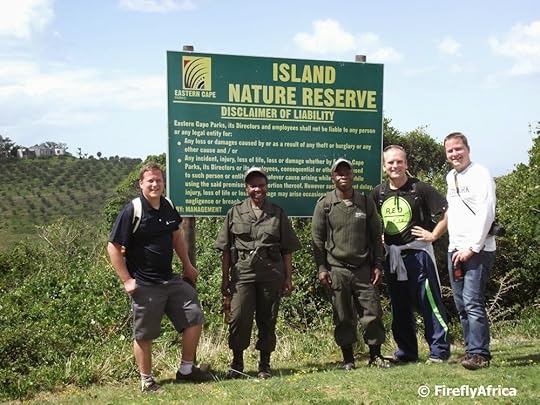 There you have it. Reserved nature as a backdrop for the real show, mankind. Should it be the other way around somehow: woman and mankind as a reserved and respectful part of nature? Just as we once created reserves for aboriginal peoples, we now create reserves for nature on parcels of land that we subjectively find appealing and usually not otherwise especially useful. We have a tacit agreement to leave these parcels mostly alone, even if we do build boardwalks through them for our convenience when we need to lift up our spirits and breath some fresh air. Even then, if the parcel is big, or found to contain something we can use within it, we will happily negotiate timber, mining, and hydrological rights to suit ourselves.
There you have it. Reserved nature as a backdrop for the real show, mankind. Should it be the other way around somehow: woman and mankind as a reserved and respectful part of nature? Just as we once created reserves for aboriginal peoples, we now create reserves for nature on parcels of land that we subjectively find appealing and usually not otherwise especially useful. We have a tacit agreement to leave these parcels mostly alone, even if we do build boardwalks through them for our convenience when we need to lift up our spirits and breath some fresh air. Even then, if the parcel is big, or found to contain something we can use within it, we will happily negotiate timber, mining, and hydrological rights to suit ourselves.



 There you have it. Reserved nature as a backdrop for the real show, mankind. Should it be the other way around somehow: woman and mankind as a reserved and respectful part of nature? Just as we once created reserves for aboriginal peoples, we now create reserves for nature on parcels of land that we subjectively find appealing and usually not otherwise especially useful. We have a tacit agreement to leave these parcels mostly alone, even if we do build boardwalks through them for our convenience when we need to lift up our spirits and breath some fresh air. Even then, if the parcel is big, or found to contain something we can use within it, we will happily negotiate timber, mining, and hydrological rights to suit ourselves.
There you have it. Reserved nature as a backdrop for the real show, mankind. Should it be the other way around somehow: woman and mankind as a reserved and respectful part of nature? Just as we once created reserves for aboriginal peoples, we now create reserves for nature on parcels of land that we subjectively find appealing and usually not otherwise especially useful. We have a tacit agreement to leave these parcels mostly alone, even if we do build boardwalks through them for our convenience when we need to lift up our spirits and breath some fresh air. Even then, if the parcel is big, or found to contain something we can use within it, we will happily negotiate timber, mining, and hydrological rights to suit ourselves.
Published on June 14, 2015 17:01
June 13, 2015
Aforementioned: aphorisms and questions for 2015
Carbon free energy by 2100 would be nice, but much too late to solve the crisis of the biosphere. 

Published on June 13, 2015 05:30
June 12, 2015
Aforementioned: aphorisms and questions for 2015
Most of the CO2 we burned into the air in 1950 will still be there in 2100 along with some from 1900. 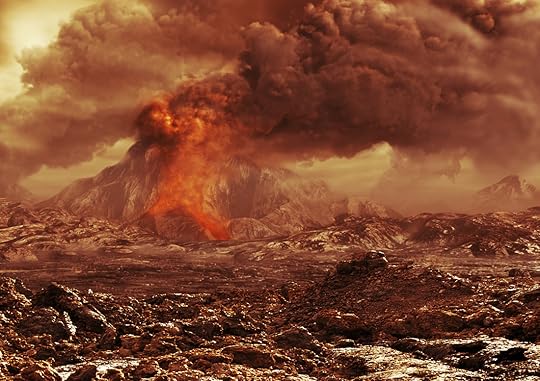 This is an artists conception of the surface of Venus. It is probably not very accurate. For one thing, its atmosphere is undoubtedly much denser and the place much more hellish. The point is, this is the path we have set the earth on. If we continue for a couple of more decades with the level of carbon inputs we have been injecting into the atmosphere, we will almost certainly convert the earth into something horrible and lifeless like this. Carbon in the atmosphere is a cumulative thing and it just keeps heating up the atmosphere until it spirals out of control. It won't make much difference if in 2100 we have converted to carbon free energy; the damage will already have been done.
This is an artists conception of the surface of Venus. It is probably not very accurate. For one thing, its atmosphere is undoubtedly much denser and the place much more hellish. The point is, this is the path we have set the earth on. If we continue for a couple of more decades with the level of carbon inputs we have been injecting into the atmosphere, we will almost certainly convert the earth into something horrible and lifeless like this. Carbon in the atmosphere is a cumulative thing and it just keeps heating up the atmosphere until it spirals out of control. It won't make much difference if in 2100 we have converted to carbon free energy; the damage will already have been done.
 This is an artists conception of the surface of Venus. It is probably not very accurate. For one thing, its atmosphere is undoubtedly much denser and the place much more hellish. The point is, this is the path we have set the earth on. If we continue for a couple of more decades with the level of carbon inputs we have been injecting into the atmosphere, we will almost certainly convert the earth into something horrible and lifeless like this. Carbon in the atmosphere is a cumulative thing and it just keeps heating up the atmosphere until it spirals out of control. It won't make much difference if in 2100 we have converted to carbon free energy; the damage will already have been done.
This is an artists conception of the surface of Venus. It is probably not very accurate. For one thing, its atmosphere is undoubtedly much denser and the place much more hellish. The point is, this is the path we have set the earth on. If we continue for a couple of more decades with the level of carbon inputs we have been injecting into the atmosphere, we will almost certainly convert the earth into something horrible and lifeless like this. Carbon in the atmosphere is a cumulative thing and it just keeps heating up the atmosphere until it spirals out of control. It won't make much difference if in 2100 we have converted to carbon free energy; the damage will already have been done.
Published on June 12, 2015 16:30
June 11, 2015
Aforementioned: aphorisms and questions for 2015
We won’t get past the crisis of the biosphere until we can think genuinely past the desires of our own species. 
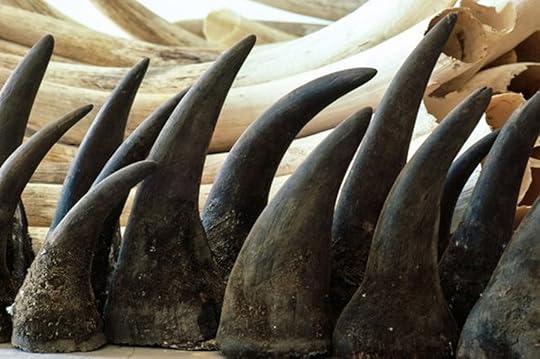
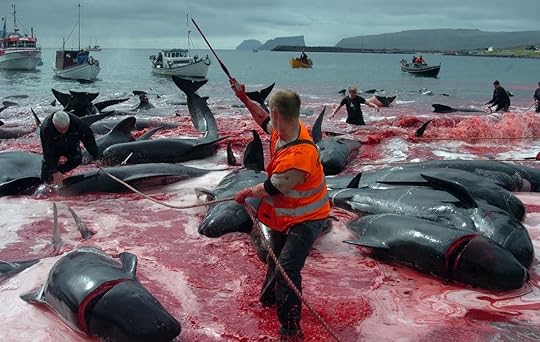
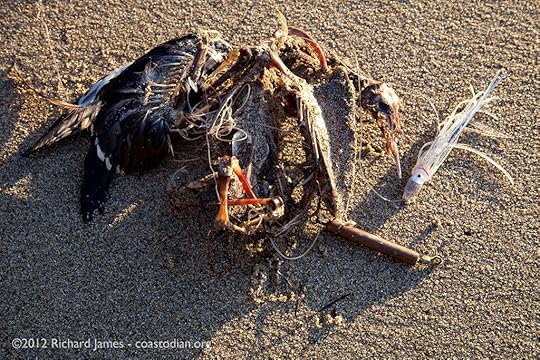 It is hard to see what utility there is in slaughtering animals like this. When we can begin to understand that we have no right to inflict such suffering we may start to heal our only home, the biosphere.
It is hard to see what utility there is in slaughtering animals like this. When we can begin to understand that we have no right to inflict such suffering we may start to heal our only home, the biosphere.



 It is hard to see what utility there is in slaughtering animals like this. When we can begin to understand that we have no right to inflict such suffering we may start to heal our only home, the biosphere.
It is hard to see what utility there is in slaughtering animals like this. When we can begin to understand that we have no right to inflict such suffering we may start to heal our only home, the biosphere.
Published on June 11, 2015 14:30
June 10, 2015
Aforementioned: aphorisms and questions for 2015
Pavement in America would cover the state of Georgia. What about other organisms that used to call that space home? 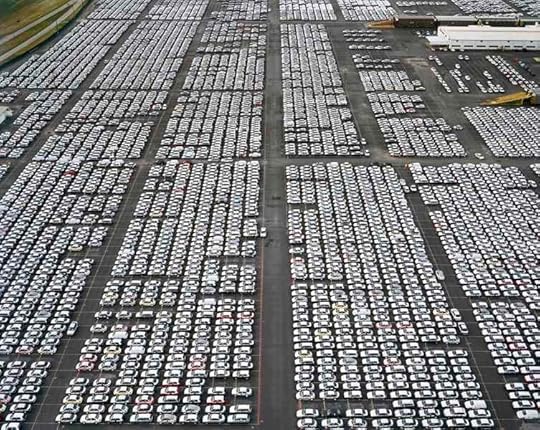


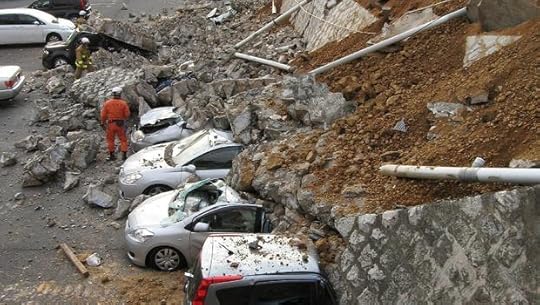




Published on June 10, 2015 07:11



